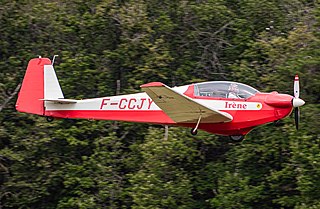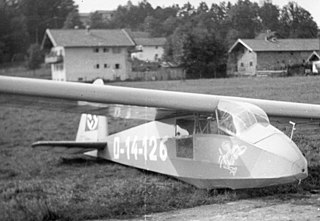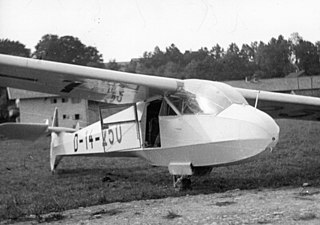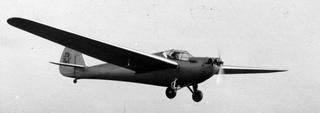Related Research Articles

The ASK 13 is a two-seater glider that was built by German sailplane manufacturer Alexander Schleicher Gmbh & Co. It was and still is widely used for basic training of glider pilots.

The Schleicher K 8 is a single-seat glider designed by Rudolf Kaiser and built by the Alexander Schleicher company in Germany.

The Scheibe Spatz is a German glider with a mixed metal and wood construction that was built in 1952 until 1962. Later versions were known as the L-Spatz, the letter L standing for Leistung, which is German for "performance".

The Scheibe SF-25 Falke is a German touring motor glider developed from the earlier Bergfalke glider by Scheibe Flugzeugbau. Since May 2006 the business has been run by Scheibe Aircraft GmbH.

The Scheibe Bergfalke is a German glider designed by Egon Scheibe as a post-World War II development of the Akaflieg München Mü13 produced before and during the war.

The IS-2 Mucha was a single-seat training glider designed and built in Poland starting in 1947.

The Scheibe SF-23 Sperling (en:Sparrow) is a 1950s German two-seat cabin monoplane.

The Scheibe SF 28 Tandem-Falke is a German motorglider that was designed by Egon Scheibe in 1970 and which flew for the first time in May the following year. It was a development of the Scheibe Falke with seating in tandem rather than side-by-side as in the original Falke design.

The Scheibe SF 34 Delphin is a two-seat sailplane that was produced by Scheibe in Germany in the late 1970s and 1980s. Designed by Wolf Hoffmann and originally designated the SF H34, it was Scheibe's first unpowered aircraft of composite construction.

The Akaflieg München Mü10 Milan is a two-seat glider aircraft that was designed in Germany in 1934. Only one copy of the design was built.

The Akaflieg München Mü15 was a two-seat glider designed and built in Germany in the late 1930s, loosely based on the Mü10. A longer span version, the Akaflieg München Mü20 was still in the design stages when further work was abandoned.

The Scheibe SF-27 Zugvogel V is a single-seat Standard Class sailplane, designed and built in Germany in the 1960s. A motorised version was also produced. Significant numbers remain active.

The Bąk (Horse-Fly) was a single seat motor glider designed and built in Poland from 1936.

The Scheibe Zugvogel is a West German, high-wing, single-seat, FAI Open Class glider that was produced by Scheibe Flugzeugbau. The first version was designed by Rudolph Kaiser and subsequent versions by Egon Scheibe.

The Scheibe SF-24 Motorspatz is a West German high-wing, single-seat motor glider that was designed by Egon Scheibe and produced by Scheibe Flugzeugbau.
The Air Est Goeland, sometimes called the Clavé Goéland, after the designer, is a French parasol-wing, T-tailed, single-seat motor glider that was designed by Robert Clavé and produced by Air Est Services of Marly, Moselle in kit form for amateur construction.

The Scheibe Specht is a tandem seat training glider produced in Germany in the early 1950s. More than fifty were built.
The Scheibe SF-30 Club-Spatz is a 15 m class single seat sailplane built in Germany in the 1970s and intended for club use.
The Scheibe SF 33 is a German motorglider that was designed by Egon Scheibe in the 1970s.
The Scheibe SF 32 is a German motorglider that was designed by Egon Scheibe in the 1970s.